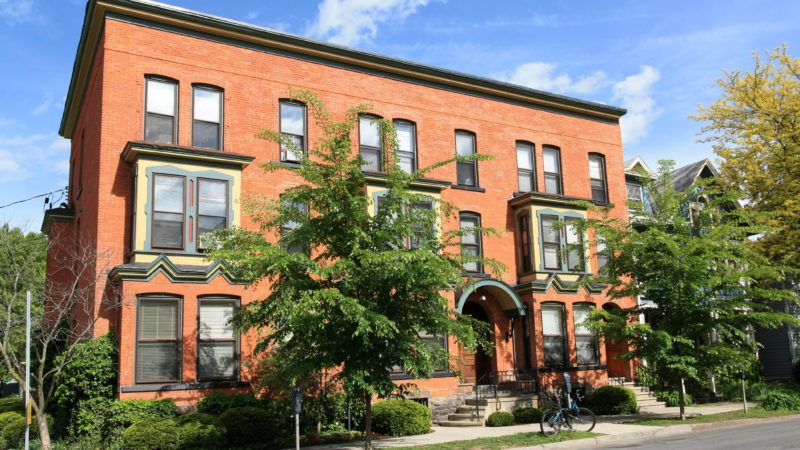(Spiroview Inc./Dreamstime.com)
The Trump administration's eviction moratorium goes into effect Friday, criminalizing rental property owners across the country from evicting tenants for the non-payment of rent. At the same time, legal controversies about similar state and local policies continue to flare up.
Last week, several landlords in Seattle, Washington filed suit against their city and state governments for imposing eviction bans, which the plaintiffs argue are an unconstitutional violation of their property rights.
Washington Gov. Jay Inslee (D) issued one of the country's first, and most comprehensive, eviction moratoriums in late February in response to the early outbreak of coronavirus in that state, banning landlords from filing for eviction unless a tenant is creating a significant health and safety risk, or if the owner is planning on selling or moving into the property. That moratorium was extended in July and is currently set to expire in mid-October.
Seattle Mayor Jenny Durkan issued her own eviction moratorium in March, which sunsets either at the end of the year or when the mayor calls an end to the city's state of emergency.
This was followed by the Seattle City Council passing an ordinance that prevents evictions within six months of Durkan's moratorium expiring. The council also passed an ordinance giving tenants a set amount of time to pay back rent that they owe. Like the state moratorium, Seattle's eviction ban prevents all evictions save for cases where a tenant poses an imminent health or safety risk to other tenants.
The plaintiffs in last week's lawsuit include two small rental property companies and one individual landlord.
One plaintiff, El Papel, LLC, alleges that two of its two tenants have refused to pay rent since April and that one of them has tried to get other renters in the building to engage in a rent strike. Another plaintiff, Karvell Li, has a tenant that has not paid rent consistently since June of last year, and who has refused to negotiate payment plans with Li.
A third plaintiff, Berman 2, LLC, owned by Osho Berman, has historically provided housing to lower-income and formerly homeless renters at below-market rates, according to the complaint. Berman has six tenants who are not paying rent and who have refused to negotiate any sort of payment plan.
"The blanket eviction ban puts landlords at the mercy of tenants who do not to pay rent, whether they face financial hardship or not," reads the lawsuit, which has been filed by the Pacific Legal Foundation. "The eviction bans have upended lease obligations and stripped landlords of one of their most basic of property rights—the right of possession—leaving them with no bargaining power and no remedy against non-paying tenants."
The lawsuit makes two constitutional claims against the state and city eviction bans, says Ethan Blevins, an attorney with the Pacific Legal Foundation. The first is that these policies violate the U.S. Constitution's prohibition on states passing laws "impairing the obligation of contracts."
"Eviction is the primary enforcement mechanism" for rental contracts, says Blevins. "When you remove the enforcement mechanism for a violation of the contract, as is the case here, you've impaired the contract."
Preventing landlords from repossessing their property from non-paying tenants, argues Blevins, also amounts to a taking of property without just compensation in violation of the Takings Clause of the Fifth Amendment to the U.S. Constitution.
"When the government forces you to allow that person to continue to reside there and you can't repossess it, that's taking a valuable property right," says Blevins.
In comments to The Seattle Times, spokespeople for both Durkan and Inslee defended their respective eviction moratoriums as legal emergency measures to prevent the pandemic from spawning an eviction and homelessness crisis.
So far during the pandemic, the number of people paying at least part of their rent has stayed pretty steady at around 90 percent at higher-end properties, which is only slightly less than where payment rates were last year. The percentage of people paying rent at is worse at lower-end buildings.
The lack of a huge surge in non-payment weakens the legal case against eviction moratoriums, Edmund Witter, managing attorney for the Housing Justice Project at the King County Bar Association in Washington, told The Seattle Times.
"Delinquency rates have not been horrible," he said to the Times. "The reality is I don't think [landlords] have too much to complain about right now."
Blevins counters that there's been no surge in evictions in places where moratoriums have expired. Data from Princeton University's Eviction Lab shows eviction filings are below historic averages in almost every city.
In late June, a U.S. District Court in New York upheld that state's eviction moratorium in the face of a legal challenge from landlords, ruling that the emergency created by the COVID-19 pandemic justified the moratorium and that limitations on when property owners could file for eviction don't count as a taking.
The Pacific Legal Foundation had sued the California Judicial Council—the rule-making body for that state's court system—over the council's eviction moratorium on separation-of-powers grounds in June. The Judicial Council announced in mid-August that they'd let their ban to expire. The California legislature has since passed a statewide extension of that moratorium.
The fact that Seattle's eviction moratorium expires six months after the emergency, and that both Washington and Seattle's eviction moratoriums protect tenants who haven't suffered pandemic-related financial hardship, makes them more vulnerable to lawsuits.
"It's extending beyond what's necessary to deal with the public health crisis or to deal with the economic fallout from the pandemic," Blevins says. "If a law isn't reasonably related or proportional to an emergency, then I think it's more susceptible to legal challenge."
